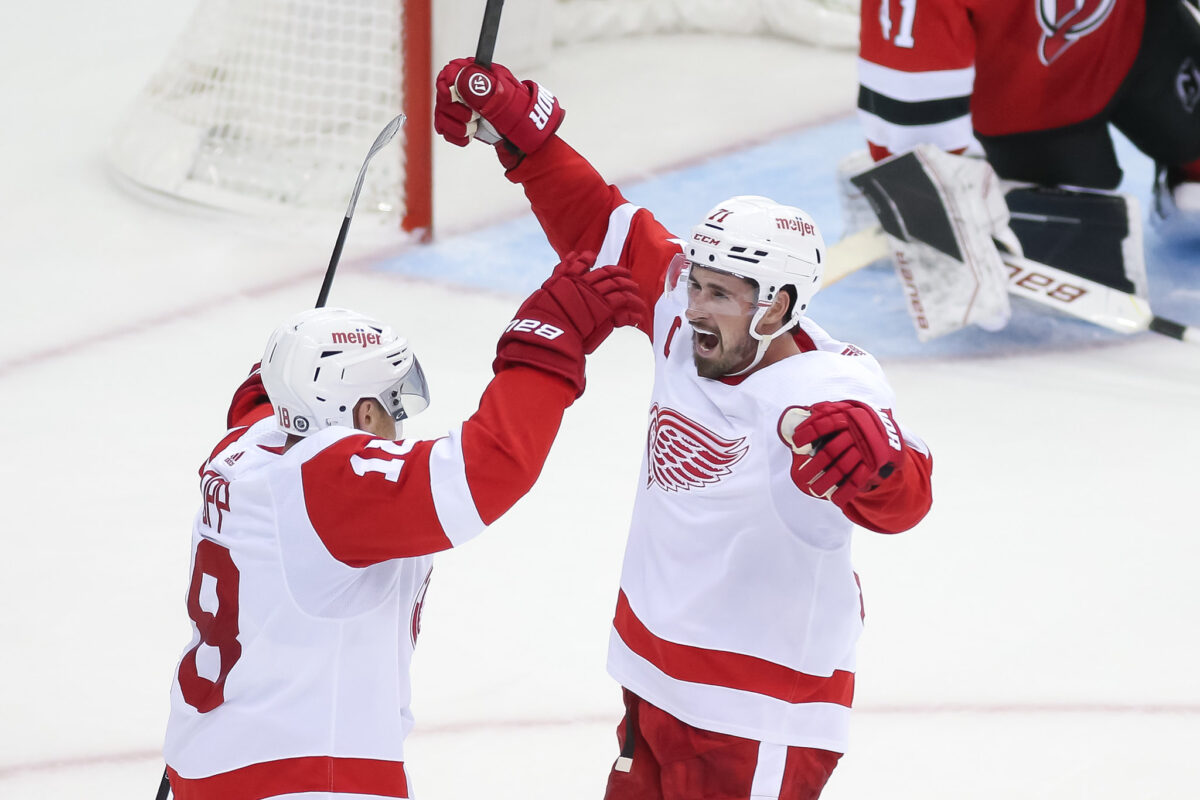After narrowly missing out on the postseason, the Detroit Red Wings made some modest roster tweaks this summer. Vladimir Tarasenko, Tyler Motte, Erik Gustafsson, and Cam Talbot were brought in, and the organization expects the team as a whole to take a step forward in 2024-25.
Given the increased emphasis on team defense this season, can the Red Wings sustain their offensive firepower that ranked ninth in goals-for (275) last year? My scoring projection model suggests that the drop-off isn’t as drastic as some suggest.
Red Wings Scoring Model: Quick Background
Surely, most of you just want to get to the numbers. I get that. But before you start forming opinions on players and their projected stats, please allow me to share what went into this model so you can have that context.

This model takes into account:
- Expected roles of the players
- Historical data
- Player age
- Contract status
- Familiarity with the coaching staff/system in place
In general, these projections should be viewed as the central point of a bell curve. Players could score more. They could certainly score less. These projections are meant to serve as the most likely scenario for each player.
Related: 4 Red Wings Who Need to Step Up In 2024-25
I’m not going to divulge the exact recipe of my secret sauce, but I did want to share that the bullets above are the variables that were factored in. Now you know that some logic went into this.
Okay, with that out of the way, let’s get to the numbers.
Red Wings Scoring Projections for 2024-25
Below are my scoring projections for each Red Wings player who I expect to play 20 or more games this season.
| Player | GP | G | A | PTS |
| Dylan Larkin | 76 | 35 | 43 | 78 |
| Lucas Raymond | 82 | 29 | 43 | 72 |
| Alex DeBrincat | 80 | 31 | 39 | 70 |
| Patrick Kane | 72 | 22 | 40 | 62 |
| Vladimir Tarasenko | 74 | 21 | 31 | 52 |
| Moritz Seider | 80 | 8 | 42 | 50 |
| J.T. Compher | 80 | 20 | 27 | 47 |
| Jonatan Berggren | 67 | 18 | 25 | 43 |
| Andrew Copp | 78 | 12 | 24 | 36 |
| Michael Rasmussen | 74 | 14 | 19 | 33 |
| Simon Edvinsson | 72 | 6 | 22 | 28 |
| Erik Gustafsson | 70 | 5 | 23 | 28 |
| Joe Veleno | 74 | 12 | 13 | 25 |
| Christian Fischer | 76 | 9 | 13 | 22 |
| Jeff Petry | 64 | 4 | 17 | 21 |
| Ben Chiarot | 80 | 6 | 15 | 21 |
| Olli Maatta | 64 | 3 | 11 | 14 |
| Tyler Motte | 72 | 6 | 7 | 13 |
| Albert Johansson | 58 | 3 | 10 | 13 |
In addition to the projections above, I anticipate several call-ups throughout the season. Marco Kasper will surely spend some time in Detroit, as will Austin Watson, Carter Mazur, and Justin Holl. It’s possible Elmer Soderblom and Nate Danielson get a few games, too.
I’m not going to project goal and point totals for these players for a few reasons. First, call-ups depend on which Red Wings player has to miss time. Second, a handful of games isn’t a big enough sample size to offer projections on. And finally, the call-ups don’t exactly have a ton of NHL history to factor into projections (minus Watson and Holl).
Final Word
Based on these projections, the Red Wings should come close to their scoring totals from last year. Defensive improvements could prevent them from reaching 275 goals again, but there’s really no way to predict how much of an impact strategy adjustments will have on team offense.
Related: Red Wings Season Preview: Depth Chart, X-Factors, Projections & More
At minimum, this team should still be dangerous offensively. If they can increase their high-danger chances and maintain their power play production, then goal-scoring will continue to be a team strength.
Data courtesy of Natural Stat Trick and NHL.com.
